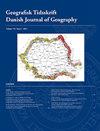The establishment of inter-municipal cooperation: the case of a polycentric post-socialist region
IF 1.1
4区 社会学
Q4 ENVIRONMENTAL STUDIES
Geografisk Tidsskrift-Danish Journal of Geography
Pub Date : 2020-01-02
DOI:10.1080/00167223.2019.1693903
引用次数: 3
Abstract
ABSTRACT The paper deals with the process of establishing inter-municipal cooperation among towns, particularly among towns in a polycentric settlement system. Emphasis is on the specific temporal context of transition from a central administration to a decentralized form. For a more detailed analysis, the territory of the eastern part of Pardubice region, Czech Republic was chosen as the study area. Our research question therefore aims at the mechanisms of cooperation experimented with by the representatives of individual towns and it reads: “Which forms of inter-municipal cooperation can capitalize on a polycentric settlement system following the dismantling of the socialist centralized governance system?” To answer this question, semi-structured interviews were conducted with authorities of towns of the area. Based on the analysis of interviews, we show four distinct stages in establishing mutual cooperation were determined: stakes, emerging border areas, connecting projects and joint territory management. They are not stages in terms of discrete periods of time, but phases in a process of getting new experience with cooperation among municipalities. Findings are that a new strategic action field needs to be established in order to achieve a form of inter-municipal cooperation that would enable to gain the benefits of a polycentric post-socialist region.城市间合作的建立:以多中心后社会主义地区为例
摘要:本文研究了在多中心聚落系统中建立城镇间合作的过程。重点是从中央管理向分散管理过渡的具体时间背景。为了更详细的分析,我们选择了捷克共和国Pardubice地区东部的领土作为研究区域。因此,我们的研究问题是针对个别城镇代表试验的合作机制,它是这样的:“在社会主义集中治理体系解体后,哪种形式的城市间合作可以利用多中心定居系统?”为了回答这个问题,对该地区的城镇当局进行了半结构化访谈。基于访谈分析,我们确定了建立相互合作的四个不同阶段:利害关系、新兴边境地区、连接项目和联合领土管理。就离散的时间段而言,它们不是阶段,而是在获得市政当局之间合作新经验的过程中的阶段。结果是,需要建立一个新的战略行动领域,以便实现一种城市间合作形式,从而能够获得多中心后社会主义区域的利益。
本文章由计算机程序翻译,如有差异,请以英文原文为准。
求助全文
约1分钟内获得全文
求助全文
来源期刊
CiteScore
5.20
自引率
0.00%
发文量
5
期刊介绍:
DJG is an interdisciplinary, international journal that publishes peer reviewed research articles on all aspects of geography. Coverage includes such topics as human geography, physical geography, human-environment interactions, Earth Observation, and Geographical Information Science. DJG also welcomes articles which address geographical perspectives of e.g. environmental studies, development studies, planning, landscape ecology and sustainability science. In addition to full-length papers, DJG publishes research notes. The journal has two annual issues. Authors from all parts of the world working within geography or related fields are invited to publish their research in the journal.

 求助内容:
求助内容: 应助结果提醒方式:
应助结果提醒方式:


